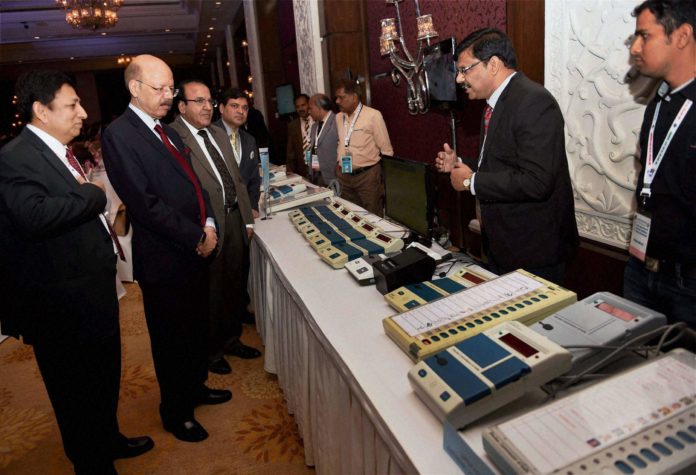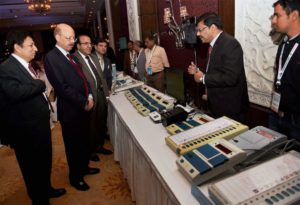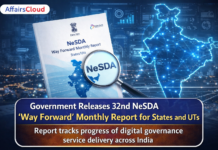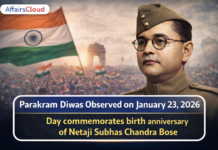The Election Commission of India hold the first ever International Conference on Voter Education in New Delhi. The topic of the Conference is Voter Education for Inclusive, Informed and Ethical Participation.
About ECI :
The Election Commission of India is an autonomous constitutional authority responsible for administering election processes in India. The body administers elections to the Lok Sabha, Rajya Sabha, state legislatures, and the offices of the President and Vice President in the country. The Election Commission operates under the authority of Constitution, and subsequently enacted Representation of the People Act.
- The Commission has the residuary powers under the Constitution, to act in an appropriate manner when the enacted laws make insufficient provisions to deal with a given situation in the conduct of an election.
- One of the most important features of the democratic polity is elections at regular intervals. Holding periodic free and fair elections are essentials of a democratic system and a part of the basic structure of the Constitution.
- The Election Commission is regarded as the guardian of elections in the country. In every election, it issues a Model code of Conduct for political parties and candidates to conduct elections in a free and fair manner. The Commission issued the code for the first time in 1971 for the 5th Lok Sabha elections and revised it from time to time.
- It lays down guidelines for the conduct of political parties and candidates during an election period. However, there have been instances of violation of the code by various political parties with complaints being received for misuse of official machinery by the candidates.
- The code does not have any specific statutory basis but only a persuasive effect. It contains the rules of electoral morality. However, this lack of statutory backing does not prevent the Commission from enforcing it.
- A law regarding the registration process of political parties was enacted in 1989 and a number of parties got registered with the Commission.The registration helps avoid confusion ensures that the political parties are brought under the purview of the commission.
- To curb the growing influence of money during elections ,the Election Commission has made many suggestions and changes in this regard. The Commission fixed the legal limits on the amount of money which a candidate can spend during election campaigns.
- These limits have been revised over time. The Election Commission, by appointing observers, keeps an eye on the individual account of election expenditure.
- The commission takes details of the candidate’s assets on affidavit at the time of submitting nomination paper , who are also required to give details of their expenditure within 30 days of the declaration of results.
- The campaign period has also been reduced by the Commission from 21 to 14 days for Lok Sabha and Assembly elections to trim down election expenditure.
About the International Conference,
The Conference was organized with an aim to share best practices, policies and initiatives of voter education by election management bodies. 27 countries and 5 international organizations are participating in the three day event which begin from October 19, 2016.
- The Conference also aims at achieving a resolution to strengthen inclusive, informed and ethical electoral participation among member countries with the help of voter education and outreach.
- This conference represents nearly 40% of the world’s population under a single roof, bears the testimony to the importance of the conference on the world stage.
- Giving the motto of “No Voter to be Left Behind”, the focus of the two-day conference will be on people. Deliberations would be held in great detail so as to adopt best practices across the world to ensure Voter Education and maximum Electoral Participation of the People.
- The proposed Draft Resolution of the Conference also notes that, the voter is the central point of the electoral framework and every voter must be thoroughly aware and educated about the electoral processes and procedures, so as to ensure his or her informed and ethical participation.

- It is noted that Dr. Zaidi was delivering the keynote address after inaugurating the first Global Conference on Voter Education titled ‘Voter Education for Inclusive, Informed and Ethical Participation’.
- The CEC also inaugurated an exhibition showcasing Voter Education tools and materials from India and across the world consisting of informational material, model polling station, provision of live voting on EVM, photos, videos, 3D models, interactive games developed by ECI has been kept on show.
Electronic voting machines (EVMs) and Voter Verifiable Paper Audit Trail(VVPAT) were demonstrated for the delegates at their request. Voter education material developed by ECI and other reports, including Braille brochures, are also on display at the exhibition.






